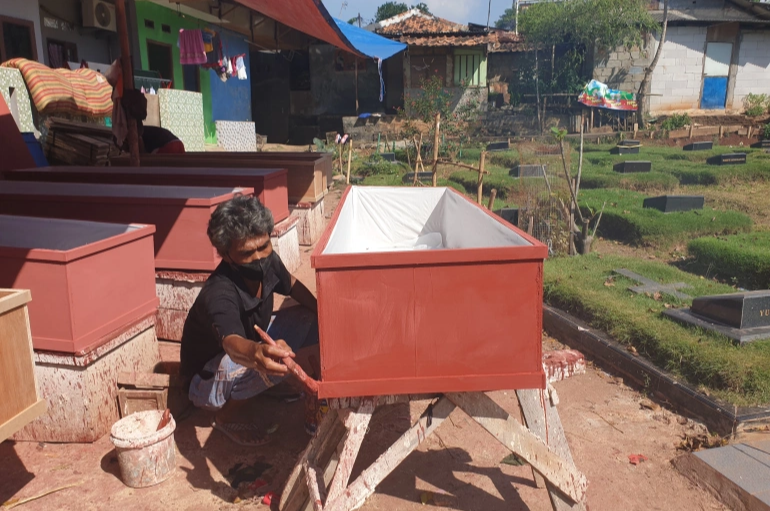
Funeral workers are overwhelmed by their workload as the coronavirus death toll rises [Jessica Washington/Al Jazeera]
Jakarta, July 5 (RHC)-- From morning until midnight, Suherman and his fellow carpenters work in the heat – sawing, sanding and painting. As emergency COVID-19 measures commence on Saturday in Indonesia’s most populous island of Java and the tourist island of Bali, many businesses are quieter than usual as millions were told to work from home – but not in this outdoor workshop in the archipelago’s capital, Jakarta.
“We are in a rush,” Suherman said. “People are waiting for coffins, so we need to work fast. The families of the deceased are waiting,” he added. “Before COVID, we did not need to work so hard. We didn’t even have targets of how many we needed to make each day. But now, we have to fulfil the demand.”
In Jakarta, on the northwest coast of Java, funeral workers are stretched to their limits. Newly constructed coffins are stacked onto trucks and dispatched to hospitals around the city. Due to the excessive workload, Suherman earns $30 extra each month compared with before the pandemic.
“I don’t mind if my income is reduced, I just want COVID to be gone,” he said. “I feel so sorry for all these families.”
On Saturday, Indonesia registered a record-breaking daily increase of almost 28,000 COVID-19 cases, of which close to 10,000 were in Jakarta. The confirmed total death toll in the country, Southeast Asia’s worst-hit nation, has surpassed 60,000 Experts warn that these figures are likely to be an undercount due to the country’s low rates of testing.
The health ministry said the rise in transmission was sparked by heightened mobility during the Muslim holiday of Eid al-Fitr, as well as the presence of the highly contagious Delta variant of the coronavirus, which was first detected in India.
Faced with a spiralling health crisis, Indonesia’s President Joko Widodo announced on Thursday a series of coronavirus containment measures, which will be in place until at least July 20.
Under the restrictions, public sites such as shopping centres and restaurants will remain shut, all non-essential workers must work from home, and domestic travellers must show their proof of vaccination and PCR results. “This situation has forced us to take firmer steps so together, we can block the spread of COVID-19,” Widodo said.
“I’m asking people to be calm and alert. Obey the regulations, be disciplined in following health protocols and support the government’s work.” The ferocity of this current wave of cases has changed thousands of families forever – and prompted questions about how many lives could have been saved had emergency measures and stricter protocols been brought into place sooner.

